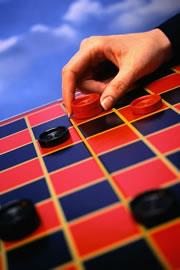 Checkers is the most complicated game yet to be solved — check out the complexity of some other board gamesPunchstock
Checkers is the most complicated game yet to be solved — check out the complexity of some other board gamesPunchstockLong-time world checkers champion Marion Tinsley consistently bested all comers, losing only nine games in the 40 years following his 1954 crowning. He lost his world championship title to a computer program in 1994 and now that same program has become unbeatable; its creators have proved that even a perfectly played game against it will end in a draw.
Jonathan Schaeffer and his team at the University of Alberta, Canada, have been working on their program, called Chinook, since 1989, running calculations on as many as 200 computers simultaneously. Schaeffer has now announced that they have solved the game of American checkers, which is played on an 8 by 8 board and is also known as English draughts.
The team directed Chinook so it didn't have to go through every one of the 500 billion billion (5 * 1020) possible moves. Not all losing plays needed to be analysed; instead, for each game position, Chinook needed to work out only a move that would allow it to win. In the end, only 1/5,000,000 of the moves were computed.
As Chinook has worked out all relevant lines of play, it needs virtually no time to 'think' to work out each perfect move in a game. The results were announced today in the journal Science1. The paper and supporting materials, including the ability to play Chinook, are available on the web at http://www.cs.ualberta.ca/~chinook/.
Jaap van den Herik, editor of the International Computer Games Journal, calls the achievement "a truly significant advance in artificial intelligence".
Un-trivial pursuit
“People continued to run for sport after the invention of the automobile.”
Ed Trice, games expert.
The solvability of a board game generally depends on two factors: the number of possible positions, or 'state-space complexity', and the difficulty of deciding on the best move, or 'decision complexity'. Tic-tac-toe is simple on both counts — simple enough to be figured out by children. Checkers, says van den Herik, is complex in both regards (see 'How hard is your game').
Chess is even harder to solve than checkers, with a state-space complexity of 1046. Decision complexity is difficult to quantify, but it is clearly high for chess. Van den Herik thinks that chess will be solved "not within our lives, but within the lives of our children — I would say between 2060 and 2070".
"Twenty years ago, we thought chess was as an infinite game," notes van den Herik. "But the proof of Schaeffer is one more signpost that we are approaching the solution."
But Schaeffer says new tools are needed before that will happen. "Chess and Go cannot be solved with the type of technology that we have today," he says. The game of Go, as played on a 19 by 19 grid, is often considered to be the hardest popular game to crack, with something like 10100 possible positions.
Game of Life
Schaeffer notes that his research has implications beyond the checkers board. The same algorithms his team writes to solve games could be helpful in searching other databases, such as vast lists of biological information because, as he says, "At the core, they both reduce to the same fundamental problem: large, compressed data sets that have to be accessed quickly."
ADVERTISEMENT
Competitive checkers players seem appreciative of Schaeffer's work, rather than being depressed by the news. "People will keep right on playing checkers," says Bob Newell, editor of the world's most-read checker publication The Checker Maven. Ed Trice, designer of a chess variant named Gothic Chess and checkers expert (having won against some world champions), says that tournament players are likely to feel "literally no negative impact to the announcement". After all, as he notes, "people continued to run for sport after the invention of the automobile".
Visit our forcheckers.html">newsblog to read and post comments about this story.
